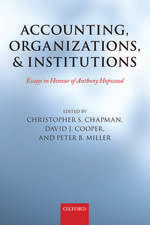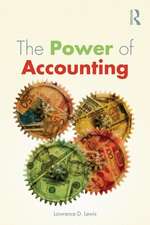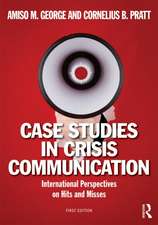The Failure and the Future of Accounting: Strategy, Stakeholders, and Business Value
Autor David Hatherlyen Limba Engleză Paperback – 14 oct 2024
| Toate formatele și edițiile | Preț | Express |
|---|---|---|
| Paperback (1) | 258.23 lei 6-8 săpt. | |
| Taylor & Francis – 14 oct 2024 | 258.23 lei 6-8 săpt. | |
| Hardback (1) | 818.83 lei 6-8 săpt. | |
| Taylor & Francis – 2013 | 818.83 lei 6-8 săpt. |
Preț: 258.23 lei
Preț vechi: 311.27 lei
-17% Nou
Puncte Express: 387
Preț estimativ în valută:
49.42€ • 51.99$ • 41.23£
49.42€ • 51.99$ • 41.23£
Carte tipărită la comandă
Livrare economică 10-24 ianuarie 25
Preluare comenzi: 021 569.72.76
Specificații
ISBN-13: 9781032925370
ISBN-10: 103292537X
Pagini: 240
Dimensiuni: 174 x 246 mm
Greutate: 0.44 kg
Ediția:1
Editura: Taylor & Francis
Colecția Routledge
Locul publicării:Oxford, United Kingdom
ISBN-10: 103292537X
Pagini: 240
Dimensiuni: 174 x 246 mm
Greutate: 0.44 kg
Ediția:1
Editura: Taylor & Francis
Colecția Routledge
Locul publicării:Oxford, United Kingdom
Public țintă
AcademicCuprins
Contents: Preface; The internal and external failure of accounting; The inadequacy of traditional accounting; Feedback failures and the need for a new accounting; The stakeholder knowledge network; Accounting for distributed knowledge; Distributed risk; Accounting for intangibles; Promises; Strategic connectivity; Financialisation; The significance for financial reporting; Illustration of 4S accounts; Summary; Bibliography; Index.
Notă biografică
David Hatherly is Emeritus Professor of Accounting at the University of Edinburgh. He has worked for Touche Ross (now Deloitte) and KPMG and has served as a non-executive director in industry. He has held academic posts at two Glasgow universities, as well as visiting positions in Australia and New Zealand. He was Professor of Accounting at Edinburgh, Head of the Accounting and Finance Group and Director of the University of Edinburgh Management School, where he taught on the MBA programme for KPMG managers and where he still teaches financial analysis and auditing. Professor Hatherly has acted as a consultant in the public and private sectors. He was Director of Accounting and Auditing Research at the Institute of Chartered Accountants of Scotland and a member of the UK's Auditing Practices Board He was a founding editor of The International Journal of Auditing and has served on numerous editorial boards.
Recenzii
'This book proposes a major revolution in financial reporting. By expanding on the traditional accounting model by accounting for the components of the market capitalisation of the business, the author challenges directly the world's present system of accounting. Using examples such as Enron and the financial crisis Professor Hatherly illustrates the deficiencies of the present model and, unusually, suggests how to rectify them. A must-read book for all who wonder where the future of reporting might lie.' Sir David Tweedie. Chairman of the IASB 2001-11; President of ICAS ’Hatherly has made an important, if controversial, contribution to the debate on improving the standards of corporate financial reporting. His proposed deconstruction of reported results and returns into discrete categories poses real challenges to the status quo and his ideas merit careful consideration and discussion. Investment managers, financial analysts and journalists would do well to read this timely book.’ Stewart Hamilton, Emeritus Professor, IMD, Lausanne, Switzerland ’...the book provides a very good starting point for instigating a broader debate in the area of financial reporting, including the entire integrated reporting debate. ...this is a book that paves the way for a productive debate on what accounting should focus on and how to go about it, as well as offering an opportunity to reconsider the focal points of current accounting and valuation analysis.’ Stergios Leventis, Accounting and Business Research, vol.43, no.6
Descriere
David Hatherly rethinks accounting in the light of the financial crisis which exposed its limitations. Financial institutions reported increasing profits and healthy balance sheets whilst their business models undermined their own financial health and the economy. Accounts failed to provide feedback on business performance. This failure highlighted









